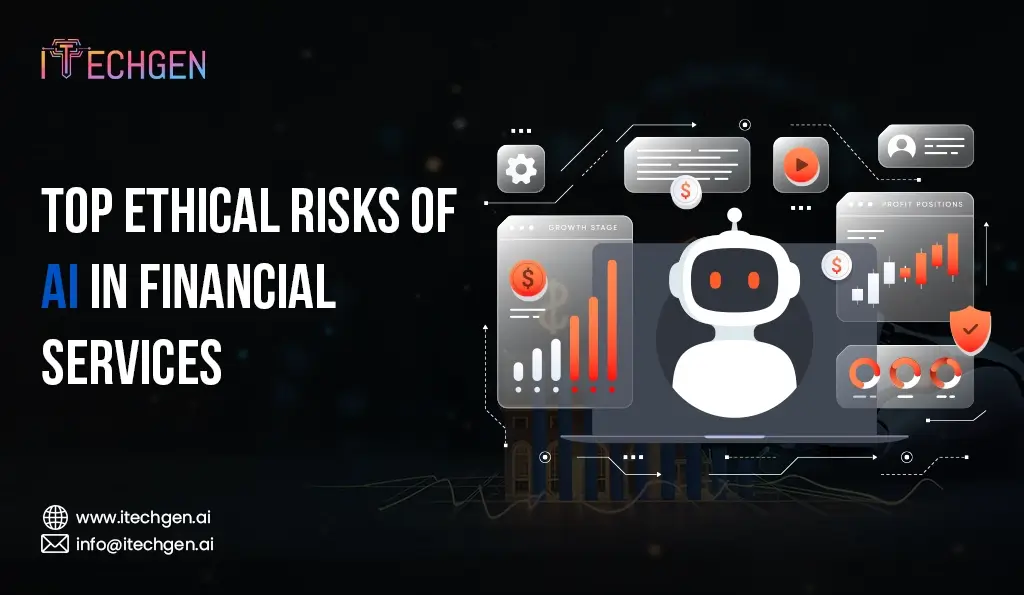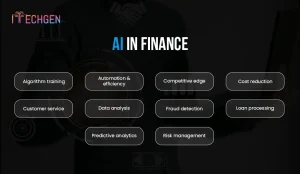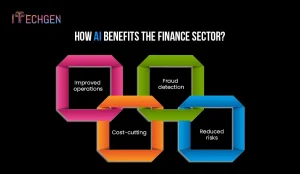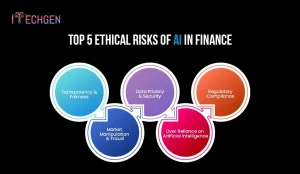
Artificial intelligence (AI) is the base of every tech industry on the globe. And finance is no different. When we talk about AI in finance, we mean things like improved productivity, enhanced risk management, automation of daily tasks, and more personalized approaches. While artificial intelligence helps financial institutions optimize their performance, ethical risks must be considered.
Some of these ethical considerations are data privacy, lack of transparency, intellectual property & copyright issues, algorithmic bias, and inherent bias in data models. For instance, Algorithmic bias is learning and replicating the biases present in the AI system’s training data. It may result in unfair decision-making and prejudiced results. Another risk can be violations of privacy. In this, AI systems process and access confidential information without consent. One more ethical implication is the lack of transparency, which means it becomes difficult for humans to understand why AI has made a specific decision.
These risks are usually surfaced due to the vulnerability of AI systems to harmful threats. They can disrupt operations and cause various financial losses. In this blog, iTechGen’s AI development team will highlight the most important ethical implications of AI in financial services to help AI institutions recognize potential risks.

AI in finance means using technologies like state-of-the-art algorithms and machine learning to monitor data, automate tasks, and enhance decision-making in a financial institution. This advanced approach automates many traditional manual banking tasks and makes financial markets more understandable. AI in finance further establishes ways to engage customers through intimate human interaction.
Check out these top ways where artificial intelligence is used in the finance industry:
Algorithm training: To analyze historical data and market trends that aid in making decisions and executing trades faster than humans.
Automation & efficiency: To automate recurring and time-consuming tasks and allow financial systems to access the vast amount of data rapidly with precision.
Competitive edge: AI in finance helps financial industries foster innovation and stay at the technological frontier to gain a competitive edge.
Cost reduction: AI helps automate tasks, minimize manual labor, streamline workflows, and boost operational efficiency which contributes to reducing costs.
Customer service: AI chatbots and AI voice assistants reduce human interaction, help answer queries, and complete routine tasks 24/7. It also delivers personalized customer service like credit score approval, fraud protection, and cybersecurity.
Data analysis: AI can analyze a massive amount of data and extract information that even scientists can’t perceive. This improves decision-making and offers an in-depth understanding of market behavior.
Fraud detection: AI helps identify fraud and cybercrimes in finance by discovering usual patterns in financial transactions. This boosts overall cyber security and makes online banking and credit card transactions more secure.
Loan processing: Predicting and analyzing loan-related risks are important in finance and AI can help with that. Automating tasks like risk management, credit, scoring, and document verification helps streamline the loan application processes for both borrowers.
Predictive analytics: Forecast future market trends, potential risks, and customer behavior more accurately.
Risk management: AI enables financial institutions to manage and process risks more effectively by creating a more secure and stable financial environment.

AI provides several benefits to the finance industry, including cost minimization, enhanced operations, fraud detection, and more. Through proper usage, financial institutions can become more efficient and make more informed decisions in today’s competitive financial sector:
Improved operations: Various finance-related services can be optimized and processed through AI for better operational efficiency. For instance, leveraging AI-powered document automation allows organizations to foster digital collaboration, streamline data entry tasks, foster digital collaboration, and document verification without relying on a manual workforce. Through chatbots and virtual assistants, financial institutions can enhance their customer support, answering personalized responses in no time.
Cost-cutting: When organizations eradicate their dependencies on manual labor and automate most of their labor-intensive tasks, such as data entry, document processing, etc., most of the operational costs will be reduced.
Fraud detection: AI has been a proven technology worldwide for detecting fraud and cyberattacks. Through artificial intelligence, financial institutions can automate their regulatory compliance processes. For instance, integrating AI in finance allows systems to analyze and report transactions in real-time and access customer data and other relevant information to discover compliance risks and flag threats.
Reduced risks: AI has immense potential in handling and mitigating risks associated with financial services like investment, loans, credit cards, and other activities that involve the exchange of money. AI-powered systems analyze historical data, market trends, etc. to identify risks and make informed decisions. This greatly helps financial facilities mitigate risks, optimize lending decisions, and decrease the risk of financial losses.

Artificial intelligence will stay with us for a very long time. While it’s a major driving force for today’s tech-driven environment, AI also involves some ethical risks. If not managed carefully, these risks may negatively affect both businesses and consumers.
Here are the top ethical risks:
Inherent Biases are common in various AI-related tasks because of their dependency on human modeling. AI experts and developers know that this bias exists but it is not possible to get rid of it completely. This means an expert must evaluate all results from generative AI to ensure fairness and precision.
For instance, making AI-based lending decisions is a perfect example of inherent bias. If the decision is affected by the potential biases from the data, it shows adverse socioeconomic trends. In such cases, ensuring transparency in the working mechanism of these algorithms can build trust and limit inherent biases.
AI learns by processing comprehensive amounts of data. But when using AI tools like ChatGPT to produce content in any form, text or image, there’s a high chance that this generated data may not be reviewed by any human. This unverified data may violate intellectual property rights or contain incorrect information.
Therefore, financial facilities must make sure that the customer data is handled securely and that they are always kept in the loop of how their sensitive information is being used and shared. Customers’ consent is very important through secure opt-in and opt-out options.
Another ethical risk of Artificial intelligence in finance is ambiguity in regulatory compliance and legislation. Financial institutions must stay aligned with today’s evolving rules and regulations. This includes that AI developers and financial institutions must work in collaboration with policymakers and regulatory bodies to build a framework that follows legal and ethical standards.
Since the evolution of artificial intelligence in finance, risks of fraud have also increased. Those involved in fraud can leverage AI voice-cloning tools to impersonate others, such as a friend or relative, to trick them into transferring money. These types of ethical implications include spear-phishing. Spear-phishing is AI’s ability to mimic voices. To tackle that, financial institutions and security companies must build modern, state-of-the-art voice detection systems to identify these fraud attempts and protect users.
Overdependence of artificial intelligence may result in unwanted implications. Many AI-powered tools like ChatGPT provide amazing results but they are not error-free. These tools fetch data scraped from the internet, which may contain insufficient or outdated information.
The need for automated data must be verified and reviewed manually before using it, especially in the finance sector. Proper checks and regulatory policies can help financial institutions to eliminate fraud, financial losses, legal risks, and reputational damage.
Through the blog, we have already seen the significant role of AI in finance. It has the ability to drive operational efficiencies, reduce costs, and improve overall experiences. However, it is necessary to address the ethical risks associated with AI head-on to ensure that this evolving technology remains a boon for everyone. Factors like data privacy, transparency, and compliance must be valued with diligence, innovation, and a deeper commitment to uphold high standards of responsibility. Businesses adhering to such responsibilities and commitment will benefit from AI and be able to build strong and long-term relationships with their clients.
At iTechGen, we don’t just provide AI development services – we also help businesses navigate these ethical risks. Our experts ensure that all AI technologies are implemented responsibly and securely into your systems to help minimize risks. Reach out to us and learn how we can help your business thrive.

Pankaj Arora is the Founder & CEO of iTechGen, a visionary leader with a deep passion for AI and technology. With extensive industry experience, he shares expert insights through his blogs, helping businesses harness the power of AI to drive innovation and success. Committed to delivering customer-first solutions, Pankaj emphasizes quality and real-world impact in all his endeavors. When not leading iTechGen, he explores emerging technologies and inspires others with his thought leadership. Follow his blogs for actionable strategies to accelerate your digital transformation and business growth.
View More About Pankaj Arora